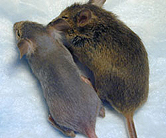
THURSDAY, July 26 (HealthDay News) — Colonies of bacteria that call your skin home may help direct your immune system to fend off pathogens and other threats, new research in mice suggests.
In the study, researchers introduced a parasite (Leishmania major) that causes skin infections to several groups of mice. One group was bred to have none of the normally present microbe colonies on their skin. A second group had typically present microbe communities, called “commensal bacteria,” on their skin.
Mice with no skin microbes couldn’t mount an effective defense against the parasite. In simple terms, they had far more bugs in their ears than mice with the normal skin microbial communities.
After the researchers introduced common bacteria found on the skin — Staphylococcus epidermidis — to the bacteria-free mice, their immune systems became much more effective in fending off the parasite.
The results suggest that skin bacteria, like bacteria found on other parts of the body, are important for a healthy immune system, the researchers said.
“The skin bacteria are really critical for controlling immune cells in the skin. They educate immune cells, tell them what to do,” explained study author Shruti Naik, a doctoral candidate at University of Pennsylvania and research fellow at the U.S. National Institute of Allergy and Infectious Diseases. “The pathogen is stealthy, like a burglar. It doesn’t want the immune system to detect it. The commensals stimulate the immune system, acting as an alarm saying, ‘There is a bug here. You need to fight and ward off this bug.'”
The study is published in the July 26 issue of Science.
A growing body of research suggests that the microbes living in various places on human bodies — nasal passages, mouth, gastrointestinal tract, urogenital tract and skin — play an important, though not fully understood, role in human health. So far, microbes of the gut have been the best studied, Naik said.
“It’s becoming more and more clear that bacteria that live with you are really important for human health. A lot of the focus of research is in understanding the importance of bacteria in the gut,” Naik noted. “But there [are] bacteria that live in urogenital tract, the mouth, on the skin. The question is, are they doing anything? And what is their contribution to health?”
What’s sure is that humans carry around lots and lots of microbes. Human bodies are home to ten times as many microbial cells than human cells, said Justin Sonnenburg, an assistant professor of microbiology and immunology at the Stanford University School of Medicine.
“There is a huge paradigm shift happening. We’re realizing that we as organisms are not just human cells, we are human and microbial cells put together, and microbial cells are a really important factor in dictating autoimmune response, infection response, metabolism and even potentially aspects of behavior,” Sonnenburg said. “The list goes on and on for many, many facets of our biology.”
The effects of microbes can be positive, as in the case of the mice fending off the parasite, Sonnenburg said. But microbial communities also have the potential to spur a negative response, perhaps driving inflammation associated with conditions such as eczema or psoriasis, he said, adding that most of the research done has uncovered associations between certain bacterial communities and various conditions, not direct causality.
For example, researchers have found that the bacterial skin flora of people with eczema differs from that of people without the skin condition, but how that impacts the skin condition is unknown, Niak said.
Also unknown is what effect our current hygiene practices are having on altering naturally occurring microbial communities, and how that might be changing the diseases we develop or the infections we’re susceptible to, Sonnenburg added.
Sonnenburg called the current research “beautifully done” in showing a strong link between mice microbial skin communities and immune response.
However, experts note that while studies involving animals can be useful, they frequently fail to produce similar results in humans.
More information
The U.S. National Institute of Health’s Human Microbiome Project has more on the role of microbes and the human body.

